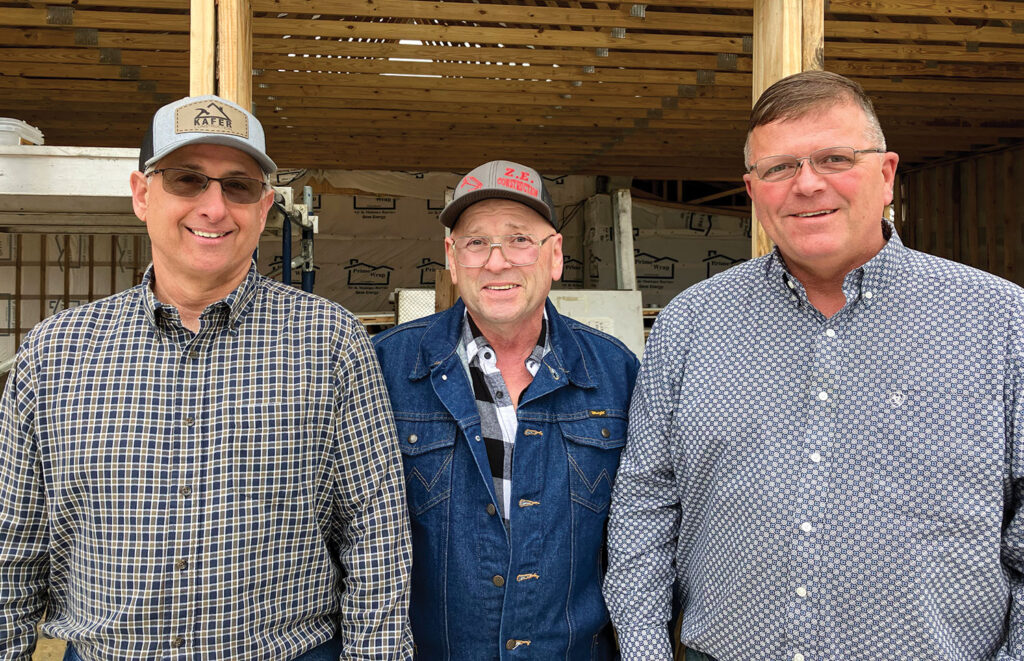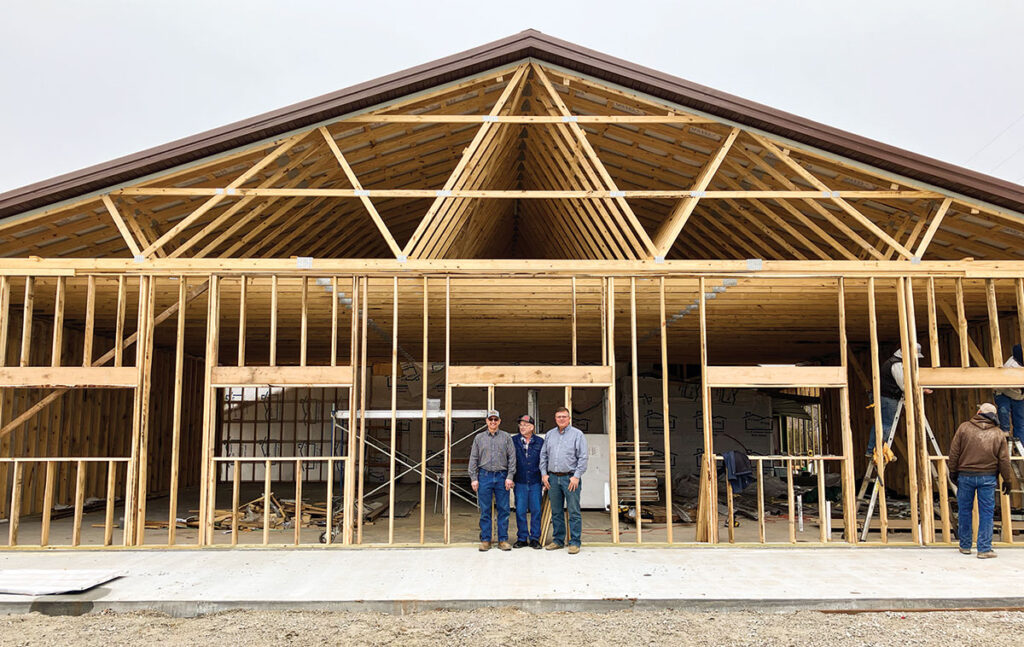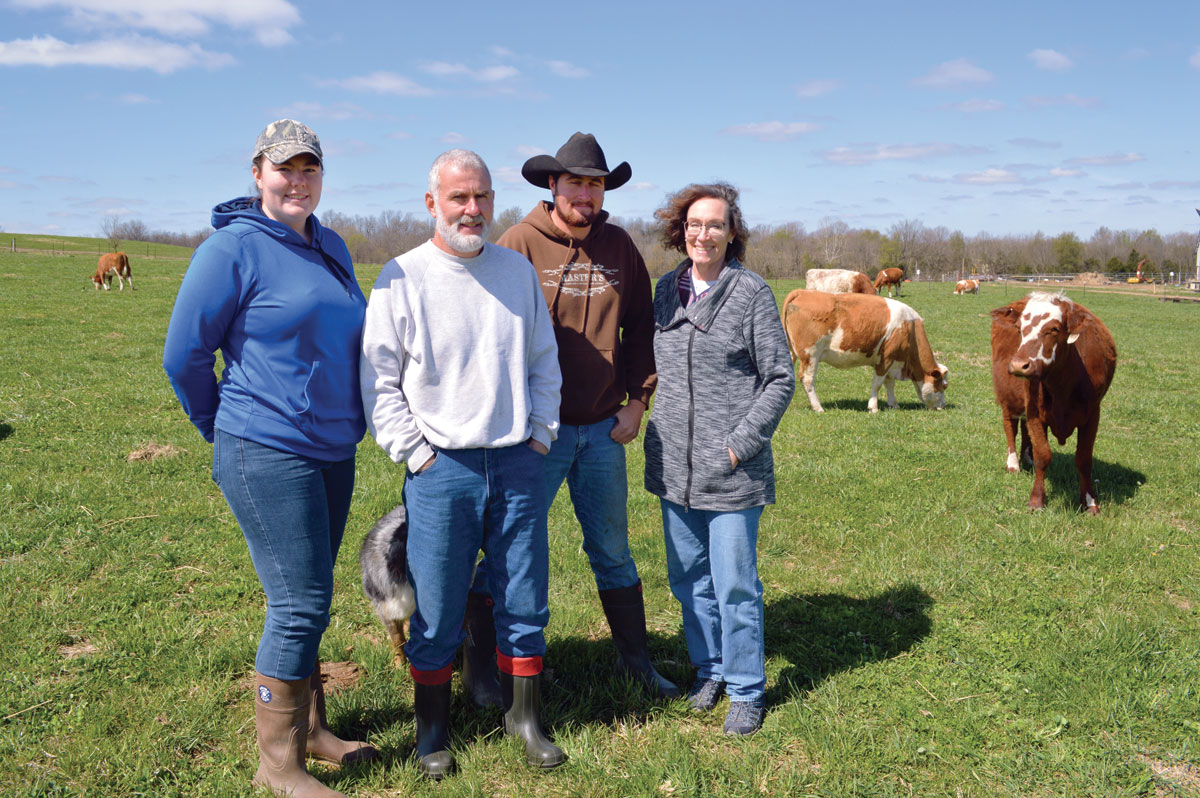
After opening a small facility to process their own meat, brothers opt to expand their business
NEVADA, MO. – As brothers, Monty Smith and Leon Stacy reminisce about growing up and working in their family’s meat processing facility, they admit as teenagers they weren’t always happy with the duties and chores. The brothers eventually moved to other careers, and the processing facility, Vernon County Meatpackers, which their parents purchased in 1973 in Nevada, Mo., continued to operate until in 2005 when a fire destroyed the facility. Their parents opted not to rebuild. With the loss of the family business, the brothers thought that chapter of their lives had closed, but nearly two decades later, that all changed.
The brothers said they missed the farm-raised, locally-processed meat they grew up with and liked, but they never considered opening their own processing facility.
“A buddy of mine and I were baling hay, and he said, ‘You and Monty need to build a little kill plant.’ I thought about it, called Monty, and we talked about it. Then we started looking at what we had as far as metal and lumber and what we could do with that. We started putting things together, then COVID hit. When that hit, everyone was looking for meat and found out about us and kept asking if we could butcher theirs.”
They were not set up for custom processing, but Leon discovered there was grant funding available through the Missouri Department of Agriculture and Small Business Development Authority to help them get back into the family business.
“I told Monty about it and said, ‘If we’re going to do this, we need to look at this,’” Leon recalled. “We didn’t think we were going to get into this; I was 60, already retired and doing my own thing. When we were kids, we had to do it because our dad made us work in the summers. When we got out of high school, we went our own way. Getting back into it now as an adult, it’s fun. We look back at what we did and we’re trying to incorporate that same kind of [family] atmosphere back into this one as when we were kids. We want our employees to be like a family, make us a team. We want to work together and make sure everyone knows what everyone else’s job is. If someone is sick, we can just step right in and fill in. That’s the way it was before; it was just one big, happy family. That’s what we want here.”
The current facility at Vernon County Meats is about 1,000 square feet. They are currently in the process of tripling the square footage, which will include the addition of a retail storefront.
“Part of what we did years ago, and part of the grant requirement, was to market to restaurants a good, high-quality product with good taste, tenderness, and flavor like an old-time butcher shop,” Monty said.
About 10 head can be processed a week. Once the new addition is completed, Vernon County Meats will have the space to process nearly three times more.
“It will also give us the capability to get things done quicker,” Leon explained. “Right now, in the space we have, we have to cut up everything in the original area that we built. We have to share the cutting area with the kill floor; we have to take everything out, clean, then put everything back. When we are done with this facility, we won’t have to do that anymore. We can keep our cutting room cutting five days a week and still work on the kill floor; we won’t have to stop anymore. It’s going to speed things up, so once we get to that point, it will be a game changer.”
The addition is expected in early to mid-May. Monty and Leon plan to add at least one employee, if not more and offer a part-time high school student to learn the trade.
Already a part of the team is Bill Jacks.
“Bill was my dad’s right-hand man,” Monty said. “He was there for 32 and a half of the 33 years.” Bill has already been a pivotal part of Vernon County Meats. Since December 2021, he has been there to educate, help and mentor Monty and Leon as well as the new employees.

The closest meat processor or butcher shop to Nevada is 35 miles away, and locals are ready for the return of a hometown processor, the brothers said.
“It’s been overwhelming,” Leon said of the support. “I get calls every day wanting to know when we’re going to have the retail store open or when will we be able to get this or that. The people are so excited for this and can’t wait. They call and ask if we’re going to make the sausage like we used to make or if we’re going to make summer sausage, beef jerky and snack sticks. It lifts you up to know your community needs this and wants it.”
Monty and Leon, who are also cattlemen, said they never imagined the idea to process their own meat would become a business.
“That wasn’t the plan,” Monty said. “I have a full-time insurance business, so Leon manages [the meat plant] everything. This [the large scale meat plant] was never in the works to start with. The plan was to build a small plant and do our own stuff, maybe a little for friends, but it’s grown from there.
“We aren’t marketing anything retail at this point, but it’s given local producers an outlet. Long term, once we get inspected and are able to sell retail, the goal is to buy as much local beef, pork, sheep and goat as possible from local producers. We want to give them another opportunity to market their products. We also have five or six producers that are direct marketing meats to producers that are using a facility that is under inspection, but we will be able to do that locally. Those people already have a market established, so this will give them another avenue to have it processed.”
As teenagers, Leon and Monty might not have appreciated their family business, but they now are enjoying getting back into the industry and are thankful for those years learning the trade.
“I don’t think anyone realizes how much you learn when you’re growing up because it’s just what you do; that’s the environment you grow up in,” Monty said. “Years later, that knowledge and experience give you a springboard to not only do that again but to do a lot of different things with that same experience. Meat processing has changed in the wake of COVID because American consumers realized how unstable and how easily their food supply can be disrupted. They realized something locally-grown or close to home can give them access to a good, healthy products, and that’s extremely important. The younger generation started to change it because they wanted to know where their meat comes from. It’s changed for everyone now and they see how important that is.”
“I hope the local producers and the local community have an established place to take their products to, and that the consumers in the community can get a local, fresh product,” Leon added. “They will know where their product comes from, and we can tell them where we bought the beef, and customers can drive by and see how their animals are raised. If for some reason they have an issue, they can come to a local company that will take care of them and treat them right.”
The brothers will share their experience in the fifth annual 2023 Farm to Fork Summit and Expo on March 3 in Nevada. The event is spearheaded by the Osceola-based New Growth, a nonprofit affiliate of West Central Missouri Community Action Agency and Rural Community Development Corporation. Leon and Monty are hopeful those who hear their story will see it is possible to start from the ground up.
“I hope they come away with the thought that you can take an idea and start with that, then get other people involved to help you,” Monty said. “There’s a lot of people out there to help you get started. We didn’t realize all the different grants and things that are out there and accessible to you, and that you have to know the right people and resources who know where to look to find those things; they can really help.
“This is also an opportunity to tell your story and the experiences you’ve had to get you to that point. You have to start small, start with an idea, and continue to grow and develop it.”







